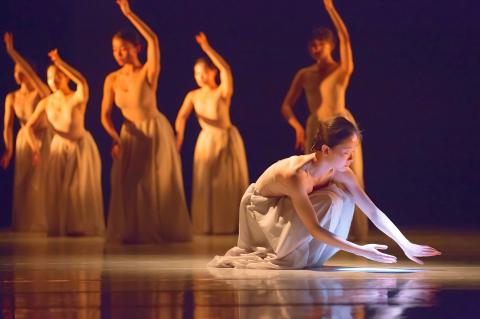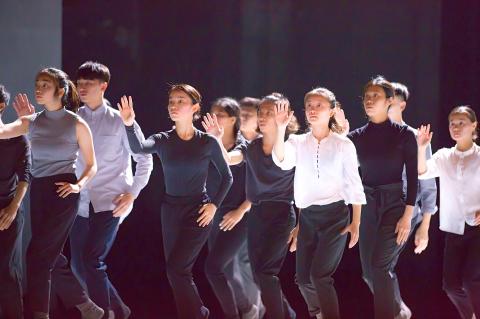There was some impressive talent, homegrown or temporarily Taiwan-based, on show in Taipei over the weekend, ranging from established and up-and-coming choreographers to playwrights and actors in the city’s English-language community theater movement.
Despite some uneven performances, there were more hits than misses.
It is hard to do a critique of the annual spring show of Focus Dance Company (焦點舞團), the student-run troupe of Taipei National University of the Arts (TNUA, 國立臺北藝術大學), given there are usually two programs with different works to provide as many students as possible with a chances to perform, so if you only see one show, you know you are missing out on something.

Photo courtesy of Hsieh Cheng-han
Yet the mix of student-choreographed works alongside pieces by faculty and visiting guest artists offers a chance to see emerging talent onstage and behind the scenes.
However, while Saturday night’s performance of Cumulus (朵) at the university’s Dance Theater was enjoyable, it also felt flat compared to previous programs, though not for lack of trying. Of the seven dances, the two best ones were former Netherlands Dance Theater member Bryan Arias’ The Sky Seen From The Moon and faculty member Tung I-fen’s (董怡芬) Great Freedom (搖晃的自由), set to Ravel’s Bolero — both complicated group pieces that kept the performers on their toes.
INEXPERIENCE

Photo courtesy of Hsieh Cheng-han
The show got off to a strong start with a lovely little taichi-influenced meditative piece set on seven dancers, Siao Rong — Linear (消融 — 圜) by student Lin Jyun-yi (林俊毅).
All for One (又又), a romp in two baskets duet choreographed by student Cheng Ching-wen (鄭晴文) was a cute confection, but more froth than substance.
I liked Somewhere Between Us (我們之間) by student Wang Chih-shen (王志慎), a work for five dancers set to Johannes Brahms’ Hungarian Dance No. 5, but like the following piece, A Tiny Little Story (一件關於你和我們的事) by Lao Poi Lon (劉沛麟), it did not really go anywhere.
10-6 into the SKIN, a duet choreographed and performed by Tan Sen Cai (陳森財) and Cheng Wei, picked up toward the end, but the slow start hampered its development.
Focus will be taking Cumulus on tour next month and in May, with stops in Tainan on April 13, Taoyuan on April 21, Taichung on May 11 and Kaohsiung on May 18 (www.artsticket.com.tw). There are also plans to take a few of the pieces to dance festivals in South Korea and elsewhere this summer.
It was also hard to judge the overall quality of the 2019 CoDance (2019 相遇舞蹈節) production at Huashan 1914 Creative Park’s Umay Theater last weekend, as I was only able to see one of the three programs on offer, but the “C” show of works by Lin Yi-jie (林依潔), Lai Hung-chung (賴翃中) and Luo Wen-jinn (羅文瑾) was an “A” production on Saturday afternoon.
It was great to have the chance to see Lai’s Raining in The Room again. Choreographed for Kaohsiung City Ballet’s 2017 Dance Shoe (點子鞋), the original was a gothic-flavored romantic duet that seamlessly blended classical ballet with contemporary dance and isolationist movements, flawlessly performed by Cheng I-han (鄭伊涵) and Chien Lin-yi (簡麟懿).
This time around, there was less romance and more of a foreboding feeling, with Chien pulling invisible strings above a often crumpling Cheng. The two have been dancing regularly together for Lai over the past two years and they are a great partnership.
Controlling strings were much more visible in the other two works. Lin’s Peng Ju Teng Syi (蹦.舉.騰.思) is a duet with bungee cords for two men that shifted between freedom and control. It made me want to put a bungee cord line somewhere in my house as well.
Scarecrow Contemporary Dance Company (稻草人現代舞蹈團) artistic director Luo offered an excerpt from her 2017 production Abyss (深淵), moving from animal-like movements to more human ones as the dancers doned clothes handing from scores of lines hanging from the ceiling, only for one, Luo, to end up trapped in a web of her own making.
Luo was joined by company regulars Li Pei-shan (李佩珊) and He Jia-yu (何佳禹), while Chien made a great fourth.
‘TAIPEI SHORTS’
At the Red Room on Friday night, Taipei Shorts was a whirlwind introduction to some intriguing writers and characters through six one-act plays that averaged about 15 minutes apiece. While the acting was uneven, there was a lot of enthusiasm and action, and perhaps more blood than those sitting in the front row would have expected.
The evening opened with Why Is John Klug Here? by Rick Monday and Paul Despins, a police procedural set amid a children’s music competition; followed by Your Country Needs You by Shashwati Talukdar, a political satire with current event overtones; Chris Dore’s Penny, Tim, Maxo’s Bar, a “cute meet” story involving a misperceptions and a bloody hand cut; Chris Lanning’s Mr Pu-Pet and the Woman, a human-resources executive’s very bad interview appointment; Deni Carson’s The Love Drug about an assassin’s effort to keep her job and a boyfriend, and Albert, Alex, Alice and the Inversion, a fast-paced comedy by Barry Hall about a couple’s complicated living situation with his reclusive brother and involves Schrodinger’s cat.
I thought the producer saved the best for last with Carson’s and Hunt’s pieces. Kudos to James Lo as a man trying to avoid his execution by playing on his lovesick killer’s apprehensions, and to Pat Woods, who had an enormous amount of philosophical exposition to get out in a rapid-fire pace as the annoying, self-obsessed brother-in-law and he did it well.
Plans are reportedly in the works for a follow-up production in the fall.

In the March 9 edition of the Taipei Times a piece by Ninon Godefroy ran with the headine “The quiet, gentle rhythm of Taiwan.” It started with the line “Taiwan is a small, humble place. There is no Eiffel Tower, no pyramids — no singular attraction that draws the world’s attention.” I laughed out loud at that. This was out of no disrespect for the author or the piece, which made some interesting analogies and good points about how both Din Tai Fung’s and Taiwan Semiconductor Manufacturing Co’s (TSMC, 台積電) meticulous attention to detail and quality are not quite up to

April 21 to April 27 Hsieh Er’s (謝娥) political fortunes were rising fast after she got out of jail and joined the Chinese Nationalist Party (KMT) in December 1945. Not only did she hold key positions in various committees, she was elected the only woman on the Taipei City Council and headed to Nanjing in 1946 as the sole Taiwanese female representative to the National Constituent Assembly. With the support of first lady Soong May-ling (宋美齡), she started the Taipei Women’s Association and Taiwan Provincial Women’s Association, where she

Chinese Nationalist Party (KMT) Chairman Eric Chu (朱立倫) hatched a bold plan to charge forward and seize the initiative when he held a protest in front of the Taipei City Prosecutors’ Office. Though risky, because illegal, its success would help tackle at least six problems facing both himself and the KMT. What he did not see coming was Taipei Mayor Chiang Wan-an (將萬安) tripping him up out of the gate. In spite of Chu being the most consequential and successful KMT chairman since the early 2010s — arguably saving the party from financial ruin and restoring its electoral viability —

It is one of the more remarkable facts of Taiwan history that it was never occupied or claimed by any of the numerous kingdoms of southern China — Han or otherwise — that lay just across the water from it. None of their brilliant ministers ever discovered that Taiwan was a “core interest” of the state whose annexation was “inevitable.” As Paul Kua notes in an excellent monograph laying out how the Portuguese gave Taiwan the name “Formosa,” the first Europeans to express an interest in occupying Taiwan were the Spanish. Tonio Andrade in his seminal work, How Taiwan Became Chinese,